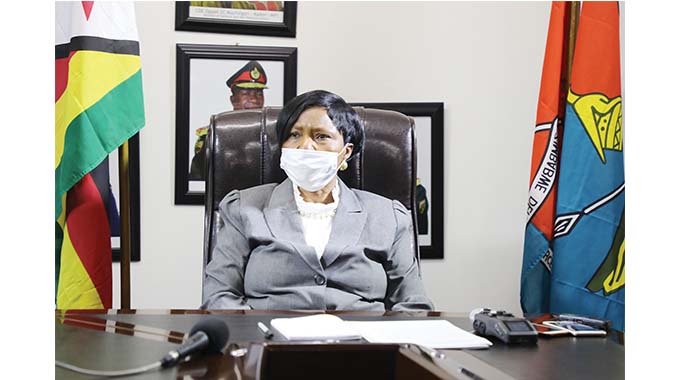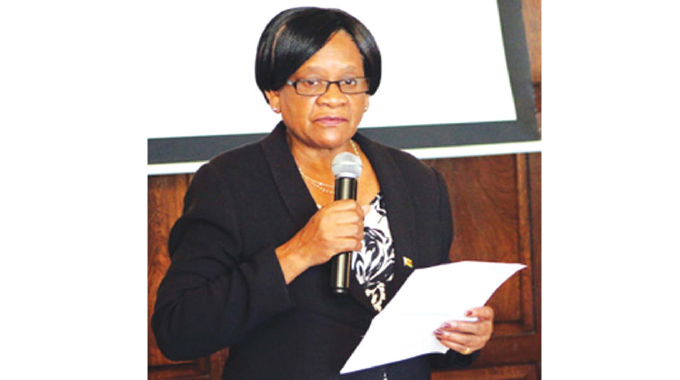The Chronicle

Sukulwenkosi Dube-Matutu, Chronicle Reporter
THE country’s independence has ushered in an era for women to be liberated and elevated to leadership positions.
Women recall from the time when they were not allowed to obtain national identity cards during the colonial era to now when they have been politically, economically and socially empowered.
When talking about women in leadership a couple of renowned names come into mind.
Examples include Defence and War Veterans Affairs Minister Oppah Muchinguri-Kashiri, who is also Zanu-PF national chairperson; Women Affairs, Community, Small and Medium Enterprises Development Minister Sithembiso Nyoni; Primary and Secondary Education Minister Dr Evelyn Ndlovu; Information, Publicity and Broadcasting Services Minister Monica Mutsvangwa, among others.
 Minister Oppah Muchinguri-Kashiri
Minister Oppah Muchinguri-KashiriOn April 18 the country will be celebrating 42 years of Independence. Women will not only be celebrating their role in liberating the country but also the significant milestone reached in ensuring gender equality.
Deputy Minister of Home Affairs and Cultural Heritage who is also Beitbridge West Member of Parliament, Ruth Maboyi said women now have better recognition in society compared to the colonial era.
“I go back as far as Rhodesia and I know exactly how unfairly women were being treated. Women were being reduced to the same level as girls and they were being referred to as children. Women were not allowed to obtain ID cards as they were only for men. The woman was just viewed as a servant whose major role was to perform various household chores. It was taboo for a woman to go to school, work or to have a source of income,” said Deputy Minister Maboyi.
 Minister Sithembiso Nyoni
Minister Sithembiso Nyoni“These are some of the reasons that made us as women join the liberation struggle as we were fed up with the injustice. Our efforts were not in vain because the woman of today is better placed than she was yesterday. Women are now occupying top posts within Government and in various institutions.”
The Deputy Minister said women were now being awarded for liberating the country. She said the struggle to liberate and gain full recognition for the woman was still ongoing. Deputy Minister Maboyi said traditional and cultural values which are being observed by communities still remained a hindrance. She said some people still doubted the capabilities of women in holding key leadership positions.
The Deputy Minister said many women that have occupied key positions have proven to be more than capable.
“More has to be done to empower women. We live in a patriarchal society and we are constantly trying to counter oppressive cultural and traditional norms. Women are capable of leading and they should be given more opportunities on merit, not because they are women. For example if we can have more women in Parliament then their voice will be amplified,” she said.
Beitbridge Senator, Cde Tambudzani Mohadi said Government has made significant strides in ensuring that more women occupy key positions. She said under the Government of the Second Republic President Mnangagwa has appointed women to occupy positions that were previously occupied by men such as Minister Muchinguri-Kashiri who was appointed Zanu-PF national chairperson.
Cde Mohadi said several other women have been recently appointed by President Mnangagwa which was a clear indication of Government’s efforts to empower women.
Dr Evelyn Ndlovu was recently appointed Minister of Primary and Secondary Education while Cde Barbara Rwodzi was appointed Deputy Minister of Environment, Climate, Tourism and Hospitality Industry.
 Minister Dr Evelyn Ndlovu
Minister Dr Evelyn NdlovuCde Mohadi said these women were appointed on merit as they have the necessary credentials. She said they had also proven to be highly resourceful in their various posts.
“We thank Government for the work it’s doing to empower and recognise women. We wouldn’t be holding these various leadership roles that we now have if it wasn’t for the independence we attained and efforts by Government. Although we have not reached the 50-50 benchmark, a lot of progress has been made and we are heading in the right direction. We also see various stakeholders such as the private sector, institutions and Non-Governmental Organisations mainstreaming gender equality,” she said.
Mangwe District Council Chairperson who is also the Zanu-PF Matabeleland South provincial chairlady, Cde Sindisiwe Nleya is one other woman who attributes her success to the country’s independence.
She said she is the first woman to hold the position of council chairperson in Mangwe Rural District Council. Cde Nleya became councillor for the first time in 2001 and she has watched the position of council chairperson being occupied by one man after the other.
She said it was pleasing that as a young woman who did not fight in the liberation struggle she was enjoying the fruits of an independent country.
Cde Nleya said there was need for communities to continue being sensitised on gender equality until capabilities of women are fully exploited.
“Women constitute most of the country’s population and there are some matters concerning them which can be best articulated by female leaders. We have a lot of women who can bring a lot of change in this country once they are given the opportunity. As women we should take advantage of our numbers and uplift one another,” she said. — @DubeMatutu
Article Source: The Chronicle
